How Albion Online is making EVE’s ruthless territory battles accessible to small guilds
A new sandbox MMO is rethinking the EVE Online formula in a fantasy setting.
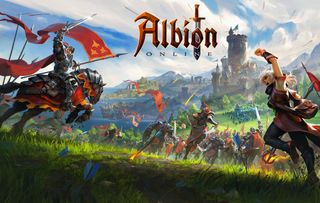
After five years of development, sandbox MMO Albion Online releases today for the first batch of players. The focus is on guild-based PvP combat and a player-run economy—much like EVE Online, the game’s primary influence. Recently, I spoke to Berlin-based Sandbox Interactive CEO Stefan Wiezorek for a rundown on what Albion is all about, what they've learned from EVE Online, and what they're doing differently.
This interview has been edited for length and clarity.
PC Gamer: I haven’t played Albion yet—since it’s close to release, I wanted to wait for a final server reset before I started.
Stefan Wiezorek: No problem, it’s a niche game anyways. Most people won’t like it.
Do you think that’s true? Most people won’t like it?
I believe that the majority of players worldwide is not our target group. We have mechanics in the game which are not suitable for a mass market. The most prominent one is, of course, is full loot system, which does not happen everywhere.
What do you mean by a full loot system?
The biggest gaming news, reviews and hardware deals
Keep up to date with the most important stories and the best deals, as picked by the PC Gamer team.
Especially the end game of Albion Online is guild-based PvP. And it’s happening in areas where if you get killed, everything falls down onto the ground, so to speak. So it’s very likely the other person will take all your stuff.
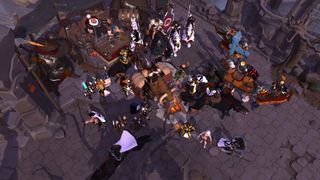
So, it’s a return to the style of games like Ultima Online or Everquest, in that sense. It was a big deal if you die.
It was not allowed in game design, if you work at a triple-A company, the game is not allowed to give the player any kind of negative experience.
Exactly, exactly … I think MMOs, at one point, developed in the wrong direction. Because as I have experienced MMOs, Ultima Online, even in a more casual MMO like Dark Age of Camelot—at that time, which is probably hardcore today—or Everquest as you mentioned, if you died in Everquest you lost XP, right? That would never be suitable today anymore. No developer would ever do that. And everything MMOs had been at that time was about simulating a real world with its ups and downs.
I think what happened, at one point, was that not only MMOs in particular, but also every game today, started what I always say is some sort of ‘noobification.’ They all had only positive effects on the player. It was not allowed in game design, if you work at a triple-A company, the game is not allowed to give the player any kind of negative experience. If you die, that’s no problem, just stand up, it’s OK, nothing happened. You lose a little bit of time, not so much.
It started a lot in the MMO industry, it started a lot with the success of World of Warcraft, where of course from a business perspective they did everything right, but for me as an MMO player that went into the wrong direction of theme park MMOs. I’m not saying they are bad or anything. It’s all good and people like them, fair enough, but I think due to their big success it dominated the MMO market so much that any other MMO in development said, ‘Oh, we have to do the same thing as World of Warcraft!’ The most prominent example is probably Star Wars Galaxies, right? The patch they made where they made the changes to how to become a Jedi is probably a good contender for number one worst patch ever made, at least from a lot of people’s perspective, I think. You have to interrupt me by the way [laughs], I can rage so much.
Rage away.
EVE Online was probably the game that had the most influence on Albion Online. But EVE, for us, always had two problems, or three problems. First of all, it’s sci-fi, which is OK and it fits for them, but I’m more a fan of fantasy. And then the other two problems with EVE Online, which is a great game—I really like EVE Online, I think they are doing such an amazing job. But from a game perspective, was the blobbing.
What's blobbing?
It’s like the amount of players you bring is more important than the equipment or the strategy of how you play. In EVE Online if you bring more players than the other group, then you very likely will win. It even doesn’t matter so much which ships you bring—to a certain degree, of course. That’s not completely right. And the other thing, my friend and I, we were playing, is the combat in EVE itself. We would like it to be a bit more skill-based than it is. But having said that, don’t take me wrong, EVE is an awesome game, and we will be happy to be just even close to the success of EVE.
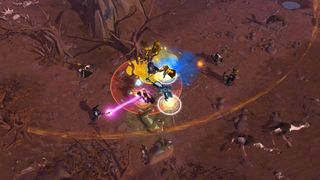
So, have you created situations in Albion where, say, three well-equipped players can take on 10 players?
Yes, yes, [that’s] happened … We even have fights where like a group of 10 killed a group of 20. It does happen. Still, having 20 players gives you a higher advantage, but skill and also gear, of course, matters in Albion.
And all that gear is player-crafted, right? During testing, how did that economy develop? Was there anything interesting about what players did with their time when they had to make everything themselves?
Surprisingly, the market so far is surprisingly boring. A lot of it developed as expected. I think the most unusual things are—we have a gold and silver market. Do you know EVE? In EVE you have isk and Plex, the two currencies. So Plex is game time and isk is a currency you use in game, and we have a similar system. And our Plex is gold and our isk is silver. And similar to EVE, we have a market for that, a player-driven market where they are trading silver and gold. And the most interesting thing is that in the early days, the majority of the founders—they get gold packages with the founders packs—they all are trying to sell their gold to get, at that time more relevant currency, silver. So in the early days, you have almost a one-to-one ratio. So, for one gold you get one silver. The clever guys are then always trying to buy as much gold as possible. Meanwhile, it is not such a hidden secret anymore … so the gold price really drops to one silver per gold, and then slowly increases over time when people have more access to more silver by grinding higher dungeons. And then, of course, a few clever people who tried to buy as much gold then sell it later for a price of 500 [silver] or something.
Other things which are interesting is probably that what works pretty good for us are the local markets. So, this is working as intended that we have different prices for different resources in different regions.
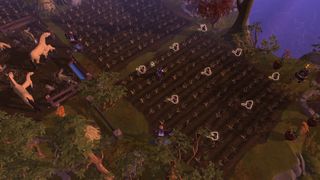
You mentioned EVE’s Plex. Is your model going to be similar, and will there be a subscription?
Instead of a subscription we use a premium model, a premium account. Because we always thought a subscription is such a hard cut, yes or no, you have to do it and if you’re not actively playing you don’t know if you should keep it up or not ... We use a premium account which gives you significant advantages, and it also costs, if you pay with euros, around about 8 to 10 euros a month. And it gives you like, 100 percent more resources, and significantly faster progress in unlocking new gear and equipment so you can wear it. But it’s not a must-have. Theoretically you can buy the game … and then play without it. But one of the other ideas, of course, is if you seriously want to play then you should have, of course, a premium account.
Another part of EVE is corporations holding territory. How does territory work in Albion. Can you build structures for your guild and claim land?
Yes, you can. And maybe just one short side note regarding the topic we had earlier…
Sure.
I also said the blobbing in EVE is something we don’t like that much. In the end, we also have, in certain areas in the game, big fights. But our vision is also that still a small guild of dedicated players—I know from Ultima Online, there were so many. So not like a huge corporation, but like teams of 10 to 20 hardcore players, that they are able to survive and not get banished from the map by the big zerg guild. And that was our idea at the time.
And coming back to the fighting, we have then, for instance, implemented small mechanics—we have some AoE abilities which have an escalating function, that the more people you hit in the area the more damage everybody gets, which works exceptionally well against large groups.
So you can hold territory with a small guild.
Similar to EVE, being physical at a certain place is very important in Albion.
In the outlands, there are territories which can be taken by different guilds. In a nutshell, you could say they are two completely different territories. One are the building territories, where you can place all your crafting buildings. You can place them also in cities, like an economy part … most of the top guilds try to ring fence their gear, their crafting buildings from everyone else. So they are trying to progress a little bit outside the general economy, because they are progressing also faster. And they do this in the outlands in their own building territories. And these building territories also have significant bonuses … because they can be taken away.
How, I will say in a minute, but aside from this you have normal territories connecting all these territories in between, and these normal territories are also important for resources. They give you different bonuses, and access to higher-tier resources in these areas. The big difference ... is that the fights around these territories are 5 versus 5 scheduled fights. So in EVE, you know that you can trigger a timer where the other guild has like 24 hours time to react. In the end you would trigger it at that point that’s the most inconvenient time for your opponent. And we figured, ‘Ah, that’s not so much fun if I’m forced to fight at 4 am in the morning.’ So right now, these territories all have different time slots … and we are trying to represent, a little bit, the word ‘time zone.’ So in in the upper circle, you have more US times, and in the lower part of an area you have more US/European times, and the opposite, so that within each territory you have a certain flexibility that you know what you’re getting into. But if you take the territory you know exactly which times you have to fight for this territory. And most of the time, there’s a 16 hour window before you can be attacked. And there is a relatively complex mechanic, meanwhile, with different mechanics, how the fight is happening, and in the beginning the defender has a few advantages, and the other guy can reduce them over several fights. But in the end, the key part is that it’s a 5 versus 5 fight, so I can sustain better against the bigger guild with more players.
But now comes the tricky part, because when I say that it’s not always—that the open world dynamics should not count at all, this is not our intentions, which sometimes people misunderstand. So for instance, if you’re fighting for a territory, the gear which is accessible to you during the fight has to be put into a war chest before the fight ... So, if I want to be safe, I can put it in the chest way before, but if not sometimes you have fights before the actual fight about the territory, so the whole guild is supporting bringing them there, so that the five guys have their equipment for the fight ready.

You have to physically go to the war chest?
Yes, yes, exactly. You are getting teleported [to the fight], no matter where you are in the world, but before, so that you have gear available, you need to go to the war chest physically, yeah. In general, similar to EVE, being physical at a certain place is very important in Albion. We have fast travelling, but it has a very high price, depending on the gear and resources you have with you. So it’s not really feasible to transport a lot of gear over long distances, and we only have fast travelling for the safe zones where you could theoretically unharmed anyway. Yeah, but in general, transportation is supposed to be an issue as well as where you are physically in the world, it’s always important. Which is also one of the biggest unknowns for us at release: where are players going to be?
EVE is one of those games that’s really not much fun until you meet people and join a corporation. Do you feel the same way about Albion? Is there anything a solo player might enjoy or is it really dependant on getting in a guild and working together?
We have developed a lore together with an author, we’ve even written a book about it, but in the end we don’t even have like, real quests like you have in an MMO.
So, in the end, I would answer yes, it is very important to get in a guild, because you will have just so much more fun. We did add, and we are adding, more mechanics to offer also offer a solo player a good part of entertainment, and good content that it’s not as extreme as it may be in EVE. It’s hard to say. We have to still consider that we are just now five years in development. We started really with three guys. Just three guys in their apartment, and now we are bigger, so if we get more time, I think if we are able to push this further.
Maybe just to give you an example, for instance, we have open world dungeons which are important to progress silver and fame—fame is the experience, to unlock new weapons. And these are the prime activities if you want to progress, if you want to gather silver or want to get fame. You have to go into the open world. Ideally in a group, because the group dungeons are more economic, over time, they give you better rewards. We have single open world dungeons. But we also have, we call them expeditions, but they are comparable to a dungeon finder in World of Warcraft. And they are staged dungeons. You can play them solo, you can play them in a group of five. But they are significantly less rewarding than going into the open world dungeons … we added a little thing, a bonus per day, so it makes economic sense it makes sense to do one expedition per day, but other than that it’s significantly better to go into the open world. And this is always where we are trying to find a good rhythm, where we also want to be a little bit more accessible than, maybe—I don’t want to talk so much badly about EVE. It’s awesome, I really like it, awesome game.
Will there be multiple, I guess ‘shards’ we used to call them, or is it more like EVE where it’s one shared universe?
One world. Because, first of all I know it from EVE, but because we are not focusing on story, per se. We are not focusing on any lore—we have developed a lore together with an author, we’ve even written a book about it, but in the end we don’t even have like, real quests like you have in an MMO. So a game like Albion lives from the interactions of the players, and this is possible if you have one shard. I also like to say shard, by the way—one server is of course wrong, because there are plenty of servers. So one shard, one world as well as EVE.
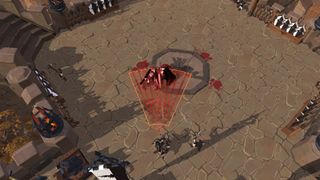
Will you play your own game? Become your own Lord British?
Hearing people talk about your game not knowing that the founder is listening is the most honest feedback you can get
I’m not only planning to do it, I’m doing it already, but with the exception that I’m playing—at the beginning I played and people knew who I was, but the problem is it’s really hard to really play your game, and also to play it and enjoy it, not getting asked too many questions. So at one point I decided to play incognito, and that’s actually one of the best things I was ever to do. So I joined one of the top guilds in our final beta and being in their Discord, and hearing people talk about your game not knowing that the founder is listening is the most honest feedback you can get, and the best information about your game. Nothing else is better, I would recommend that to everybody who is developing a game. You know, if people know who I am, they always think they have to tell me something crazy, or have to tell me how bad the game is—which the others do as well, but in a different kind of way, right? So that’s probably the best thing to do.
So now the guilds will all look through their ranks and start scratching their chins.
Yeah, yeah, I told one guild I actually played with them, and they were thinking for days who I might have been in their roster.
Albion Online launches today for players with the $99 Legendary starter pack, Tuesday with the $50 Epic pack, and Wednesday for the standard $30 price. We’ll bring you our impressions from the game’s launch later this month.

Tyler grew up in Silicon Valley during the '80s and '90s, playing games like Zork and Arkanoid on early PCs. He was later captivated by Myst, SimCity, Civilization, Command & Conquer, all the shooters they call "boomer shooters" now, and PS1 classic Bushido Blade (that's right: he had Bleem!). Tyler joined PC Gamer in 2011, and today he's focused on the site's news coverage. His hobbies include amateur boxing and adding to his 1,200-plus hours in Rocket League.
Most Popular

